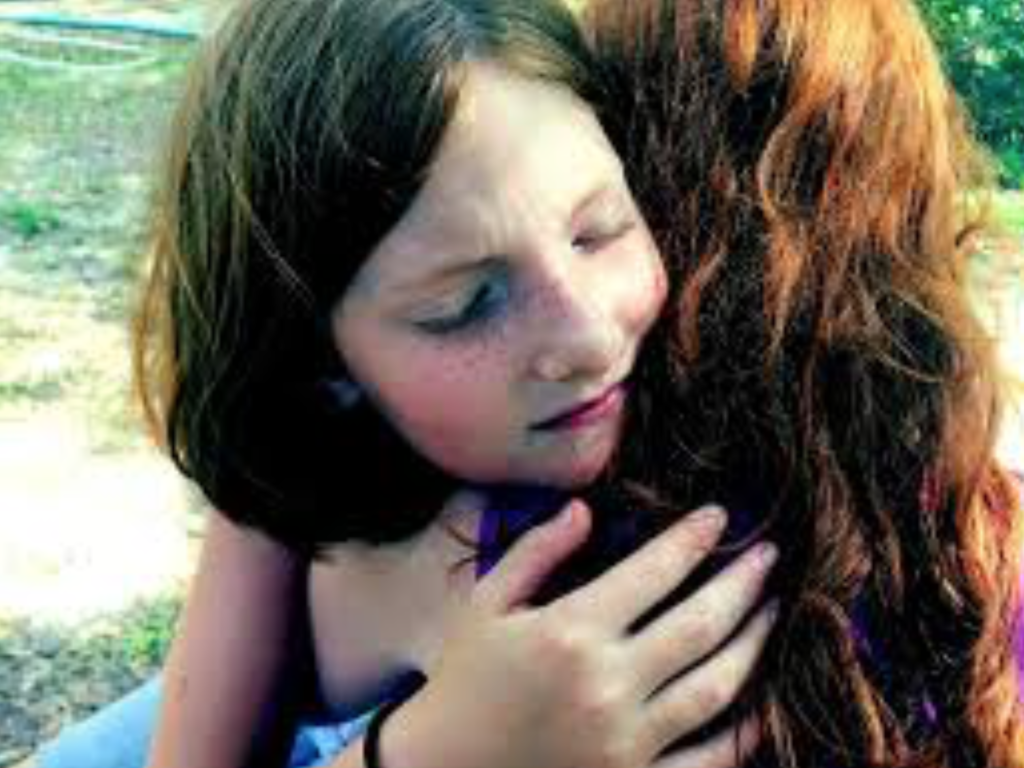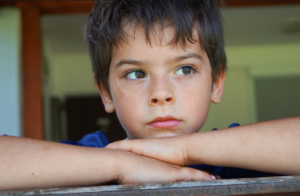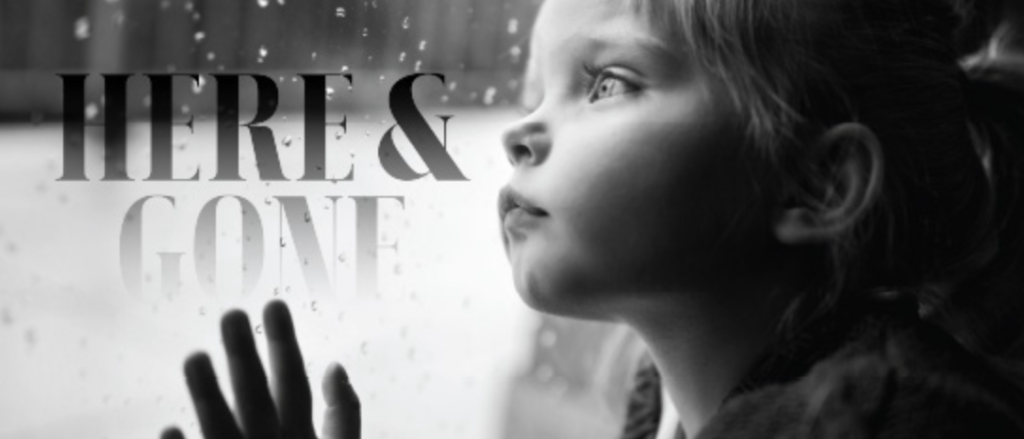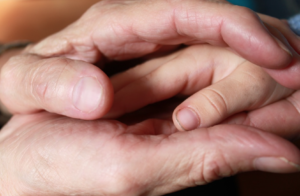DALLAS CHILD — How Children Grieve Differently
Helping Children Deal With Death and Loss
By Elaine Rogers
Precocious and communicative, 5-year-old Laynee Willingham of Plano has never met a stranger and cheerily greets store clerks, teachers and parents of friends with the same cringe-worthy line: “I’m Laynee. My dad died.”
Her mom, Jordan Johnson — still raw from her husband’s sudden death by heart attack last fall — prepares herself for these interactions every time they enter a public place or a make-new-friends situation. The 36-year-old is accustomed to Laynee’s brutal honesty, but says she never gets used to how awkwardly insensitive other adults are in the face of it.
“Sometimes waiting for the response is agonizing,” she says. “I know what’s coming, but I still find myself shocked by how incapable people are of dealing with that. They say things like, ‘Hush. No he’s not,’ or they’ll look at me and say, ‘Can you believe she said that?’ — like they’re expecting me to correct her.”
Given the aftershock of being widowed just eight years after she’d married her best friend — and the challenges of managing her own grief while trying to guide her two children through theirs — Johnson is understandably protective of her daughter.
“It’s just her way of dealing with it,” she says. “I just wish I could make people understand better that if a child shares news that is sad and shocking, they should simply show some empathy. They don’t need to fix it or sweep it under the rug. … It’s aggravating that people feel so uncomfortable about this that they don’t know how to be calm and supportive to a child.”
According to census data, 1 in 20 American children will lose a parent by the time he or she graduates from high school, while 1 in 7 will experience the death of a sibling or parent before the age of 20. Findings from the New York Life Foundation and the American Federation of Teachers note that 7 of 10 teachers report having a student in their classroom who is grieving — a figure not that shocking when you consider that children and families routinely deal with the deaths of grandparents and other relatives as well as classmates, family friends, neighbors and even acquaintances who have touched their lives.
Gina Brown, a counselor at The WARM Place in Fort Worth, notes that nevertheless, people simply aren’t very good at dealing with. grief “until it slaps them in the face.” And most of us are particularly useless when it comes to knowing how to help children going through these experiences.
“We’re not taught how to grieve, and death is something that’s not talked about very much,” Brown explains. “Most of the time, it’s not expected for a young family member to die or for a family to have a tragedy like that, so we have no idea how to teach our children how to do it.”
Although the death of a loved one is a painful thing, it is also a natural (and inevitable) part of living, Brown acknowledges, so adults ought to make the concept of dying more familiar and less scary to youngsters. Of course, this is tough to do in the midst of fresh grief, as Johnson has learned.
But to help a child heal, it’s vital for parents, relatives, teachers and other well-wishers to learn how to approach and comfort a grieving child, even years after a loss.
“No matter what your age when someone close to you dies, you never recover from the grief or the love,” says Laurie Taylor, certified thanatologist and executive director of the Dallas-based Grief and Loss Center of North Texas. “You simply reconcile it. The part of the brain that’s in disbelief has to merge with the part that knows it’s true, but the journey of grief can really take a long time.”
Jennifer Hood’s family has been on this rocky path for three years — ever since the death of her 4-year-old son David, and even before. Born with a heart defect and cerebral palsy, David endured several major heart surgeries, but Hood says the final one “did not go well,” and the family was informed that nothing else could be done. He died almost a year later, when big sister Abby was 6.
When it was time to tell Abby that her little brother wasn’t a candidate for a heart transplant or further surgeries and would be coming home for hospice care, the medical staff instructed Hood to tell her daughter the truth.
“I told her that the doctors couldn’t fix his heart or give him a new one. And it felt very jarring to say what that really meant — ‘David is going to die’ — but they said children really need the concrete terms,” the Rockwall mom explains.
“People prefer to say things like, ‘He’s with Jesus now’ or ‘He passed away,’ and that’s very well-meaning,” she adds, “but it doesn’t help children understand what happened or deal with it.”
Honest, simple terms are essential when talking about death and dying with kids, agrees Mark Hundley, a grief therapist and co-founder of the Journey of Hope Grief Support Center in Plano. He recommends bypassing common terms like “passed on” and “gone with God” because they can confuse young children.
“It’s so important to use a simple vocabulary that’s plain and straightforward — words that you don’t have to go back and redefine later,” he says.
Grief counselors especially recommend that families use clear language if a loved one is murdered, commits suicide or dies in another uncomfortable-to-talk-about way. Instead of revealing the truth, parents often try to shield their children from reality in order to protect them, Brown says.
Usually, this backfires.
“Many times, we’ve worked with children who found out the truth later and were very angry about it. They feel like they can’t trust that parent now,” Brown reports. “Kids are also much smarter than we often think they are. They hear family members talking and they know more and have access to so much more than we think, so it’s important to tell the truth.”
Brown also warns that grieving adults may mistakenly think they should hide their own grief from their children. But putting on a brave face doesn’t show children they’re allowed to grieve too.
In the same way, Taylor says not exposing children to rituals like viewings and funerals does them a disservice.
“Often, people keep kids home from the funeral and the funeral home because they think they will be afraid or it will be too hard or distressing for them,” she says. “But, not exposing them to it is what makes death so scary for them. … The more we can involve the children, the better it is for them.”
In families dealing with a traumatic death, Hundley says children may respond to the sadness of the adults around them by trying to take care of their parents, but it’s important for parents to “turn the tables” on this.
“You need to let a child know that you’re going to take care of them, not vice versa, because that’s your job,” he explains. “And it’s alright to cry and show them that you’re very sad — you’re modeling the grieving process and showing them that it’s OK to do so — but you still need to reassure them that you’re there for them too.”
INVISIBLE GRIEVERS
Abby didn’t cry about David’s death for almost three years.
“Something triggered it for her this last year on his birthday,” Hood says. “Until then, I think she just didn’t know how to express it, whether she was sad or mad or whatever, and that was a big worry and a stressor for me.”
Taylor explains that children are sometimes called “invisible grievers,” because they may remain stoic or even play while experiencing great sadness.
“At a funeral or a viewing, the child may look at the casket, then run off and play for a little while,” she explains. “Or, they’ll run right past it, come back and take a glimpse, then start playing again. … Adults will think they’re handling everything beautifully because they play, but that’s not necessarily the case.”
She adds that there are two distinctive grieving styles that experts label “intuitive” and “instrumental.” Intuitive grievers express their emotions openly, while instrumental grievers keep things bottled up and private, or channel their emotions through productive activity, such as play. Neither approach is wrong or unhealthy, Taylor explains, but rather reflects personality and emotive styles.
Ken Good, a Dallas dad whose wife was killed two years ago in a sledding accident, noted this marked difference in his three kids. Twin daughters — now 11 years old — dealt with the death immediately and expressively, while his teenage son “kept things bottled up.”
“It hit my daughters hard, but they processed it immediately,” Good says. “For my son, it seems like it was about a year and a half before he could even look at the loss. … It just seemed like it took a much longer path for it to hit his heart.”
Grief specialists say this deferral of grief expression can happen with anyone, from adults to very young children.
“Kids often hide their grief from their parents because they know their parents are very sad, and they don’t want to add to the sadness,” Hundley says. “So, the family gets a year or so down the road in the process, and then, a child suddenly begins to melt down.”
This might take the form of acting out, having angry outbursts or becoming overly withdrawn. School counselors and others might even look at a child experiencing grief and think they’re seeing symptoms of a learning disorder or ADHD.
“It can be hard to distinguish between the two,” Hundley reveals. “When a child is in crisis, there are a lot of emotions swirling around and they don’t know how to express it.”
FINDING A SAFE SPACE CAN HELP
“When children have experienced a traumatic loss, they really need to feel safe about being able to cry and talk about it and not fear being ridiculed or made to feel different,” says Jerald Garner, chaplain of VNA Ann’s Haven hospice in Denton and bereavement coordinator for SafeHaven, a grief support program for children and teens.
School counselors often refer children to programs like SafeHaven, where children can work through their feelings in the company of other kids who have had similar losses. (For a list of local grief support organizations, see “Help & Healing” sidebar below.)
 Timing is an individual choice — it might be soon after a death in the family or years down the road, as it was for Abby. Hood says her daughter’s involvement in the Shift program at Watermark Community Church in Dallas was a “game-changer.”
Timing is an individual choice — it might be soon after a death in the family or years down the road, as it was for Abby. Hood says her daughter’s involvement in the Shift program at Watermark Community Church in Dallas was a “game-changer.”
“I think that really catapulted her forward in being able to express her grief,” she asserts. “It was a big help for her to be with other children who had also experienced a big loss and to be able to express her grief with peers.”
Children often forge long-lasting friendships in these groups, and are eager to attend sessions — because in their day-to-day life, in the classroom or at swim practice, they may not have any peers who’ve experienced similar struggles, Brown explains. “It helps a lot when they realize that they are not alone.”
CELEBRATING THE LIFE
As time has passed in the Hood household, surprising questions have begun to pop up.
“Out of the blue, Abby will say, ‘I wonder what David had for breakfast this morning,’ or, on a holiday like Halloween, she’ll say, ‘I wonder what David is going to wear for Halloween,’” Hood reveals.
Despite rationally knowing a death has occurred, our brains take at least six months to begin comprehending the reality that a loved one isn’t coming back, Taylor explains. As a result, young children may continue to ask odd questions about the deceased — for months or even years after the fact.
“Even when you explain a death clearly, a child might still ask a question six months down the road like, ‘Is Daddy coming back for Thanksgiving?’” she says.
This can be an important way for children to process grief, so Taylor encourages patience with repetitive questions.
“Try not to give a short-tempered response like, ‘I already told you Daddy’s not coming back,’” she cautions.
Recognize too that as time goes on, big moments like birthdays and graduations can spark strong reactions for children who have experienced a great loss.
“When a child loses someone important in their lives, all the major milestones may be affected by that death,” Hundley says. “Milestone moments that families typically celebrate are times when the loss can feel especially sharp.”
Even smaller victories like making the honor roll or going to prom can trigger acute emotions. Adults may not be able to anticipate all the moments that might re-kindle a child’s grief, but when you can, make a point to commemorate them and express caring. Taylor suggests that friends and family members put important dates, such as the loved one’s birthday and date of death, on their calendars and make cards or send text messages to the child on those days.
“You can send emojis of things like flowers or praying hands or a boat or bicycle,” she says. “It can be something that simple. Kids really get this.”
The important part is being there, acknowledging the loss.
In the days and weeks after her husband’s death, Johnson says she was surrounded by family, then she was “left with the silence” when people returned to their own lives and routines.
“After that, people tried not to mention him,” she recalls, “almost like they were averting their eyes from something painful — or trying not to make me sad. … At one point, I remember I got mad and said, ‘I just want to say his name out loud. It’s been three days since I’ve heard it. I want to talk about him.’”
Especially when a child is grieving, adults may think they shouldn’t bring up the loss or even mention the person’s name, Taylor says. “It’s like they pretend that the person never existed, and that’s even more painful for the child.”
Instead, family members and friends should keep the subject accessible and shareable.
“We want them to make it something that’s talked about, to answer children’s questions — even if they have to answer the same one over and over again,” Brown says. “We want them to talk about it, to celebrate that life. It should be something that’s out in the open instead of being something that’s taboo to talk about.”
Hundley, whose daughter was 7 when his first wife died, says they spoke of her mom frequently and made a memory book to keep things fresh. Today, Hundley’s daughter is a teacher and mom in Frisco, but she still talks about her own mother, and tells her son about the grandmother he never knew.
“I don’t know that she actually remembers that much about her, but she knows a lot about her life and what she cared about,” Hundley affirms. “She also knows that her mom loved her very much. … The pictures and the stories keep her a part of our lives.”
A year removed from her husband’s death, Johnson frequently talks with her kids about their dad, sharing and reinforcing memories.
“Laynee liked to dress her dad up and he just let her do it,” she remembers with a laugh. “She had him wrapped around her finger. So, we still have those pictures. I hope they’ll help her remember more about him as she grows up.”
* * * * * * * * * *
When You’re Grieving Too
As you help your child through his or her grief, take care of yourself too:
· Keep your “self-care toolkit” of relaxing activities at the ready — yoga classes, gardening, reading, etc.
· Understand that family members may not know what to do or be able to help.
· Give yourself permission to laugh, cry and talk. Also give yourself permission to not talk about it when that’s what you want.
· Don’t feel embarrassed or resistant about seeking out therapy. Immediately afterward or years later, talking about the grief and loss can help.


